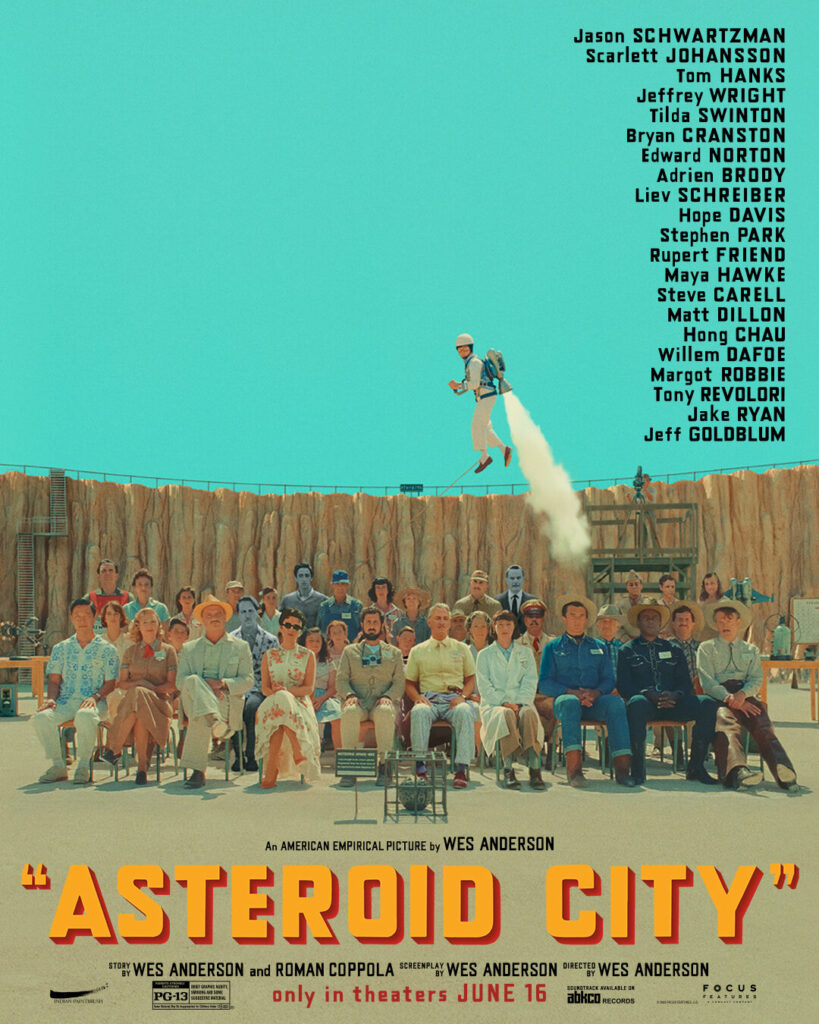Between charming color palettes, whip-smart dialogue, and rolling credits of all-star actors, it’s hard not to find something to like in a Wes Anderson film. Yet his newest meta-flick “Asteroid City” has an intangible missing element that leaves a lackluster feeling hanging in Earth’s atmosphere. But perhaps that’s just the point. As one of the main characters, Augie Steenbeck, puts it at the end of the film: “I still don’t understand the play.”
“Asteroid City” revolves around a play-within-a-film concept led by a lost playwright and his muses. Anderson skillfully parallels this reality and fiction, employing a black and white framing sequence to introduce the play’s conception before transitioning to the whimsical world it becomes. The play follows an at-first dissimilar group who have come to Asteroid City (population 87) for a Junior Stargazer/Space Cadet convention in a 1950s desert town. While the parents sip on instant martinis from a vending machine and gossip about their brainiac children, we and they remain blissfully unaware that an extraterrestrial event will soon disrupt the weekend’s itinerary, tumbling them into a government-imposed quarantine.

The ensemble includes widowed war photographer Augie Steenbeck (Jason Schwartzman), lonely actress Midge Campbell (Scarlett Johansson), overwhelmed schoolteacher June Douglas (Maya Hawke) and her exuberant group of students, a group of scientific geniuses, and so many others it’s hard to scratch the surface here. As Acts I through III unfold, we’re delivered existential musings about the meaning of it all from cynical characters who are so self-aware they seem hollow. Still, this feels like Anderson’s point: to embrace more of a poetic apathy than to adopt a sentimentality towards life’s unknowns (death, grief, aliens, and everything in between). And to not care if any of it makes sense.
Anderson accentuates this with distinctly-punctuated dialogue reminiscent of his earlier works, “The Royal Tenenbaums” and “Moonrise Kingdom.” Mirrors and dual-perspective framing serve as recurring motifs in “Asteroid City” too, symbolizing the sameness of human existence and emphasizing the importance of what lies beyond the surface. The foreground and background often hold equal significance, highlighting the notion that there is often more to individuals and their stories than initially meets the eye.
During Act I, the characters appear as disconnected as the “Closed Indefinitely,” one-way freeway ramp that stands near the town’s entrance; but, after experiencing a transformative extraterrestrial visit, they begin to question if the alienness in themselves is not the same alienness in the strangers that surround them. Soon, their unique quirks and idiosyncrasies begin to shine through the cracks in their tough exteriors to unite them. This is particularly evidenced by Steenbeck and Campbell, both the adults and their namesakes, who discuss their darkest secrets through tight-lipped honesty but still manage to form potential relationships.
By the play’s Epilogue, it feels that both progress has been made and hasn’t, that storylines have been tied up but also unraveled. And while it’s a delightful 105 minutes inside Anderson’s brain, audiences might leave with a bit of head-scratching. As moviegoer Amanda Gonzales shared, “I felt right there with the actor when he said, ‘I still don’t get what the play is about.’ It’s life. We can’t get it. Things happen. We meet people, they leave; we experience something, we forget it. What can we do with that?”
Movie Times: Click Here
Genre: Comedy, Drama, Romance
Director: Wes Anderson
Actors: Adrien Brody, Bryan Cranston, Edward Norton, Grace Edwards, Jake Ryan, Jason Schwartzman, Maya Hawke, Scarlett Johansson, Steve Carell, Tilda Swinton & Tom Hanks
Run Time: 105 minutes
Rating: PG-13 for Brief Graphic Nudity, Smoking & Some Suggestive Material





